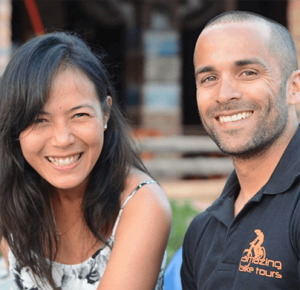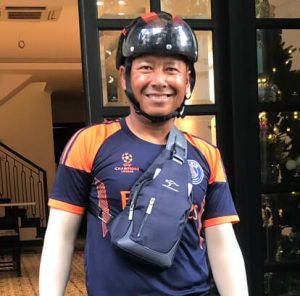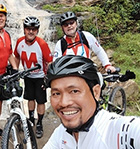The Ha Giang loop in Vietnam is one of my favorite places ever. It’s got tiny villages, amazing views, friendly locals, and an experience you’ll never forget. I think it’s one of the prettiest places in Southeast Asia, and it’s still not too crowded.
If you want a real local adventure, Ha Giang is perfect. You’ll stay with locals, eat dinner with them, and try to talk with Google Translate. It’s not fancy, but it’s super memorable.
If you’re going to Ha Giang or thinking about it, there’s a lot to know. In this guide, I’ll tell you everything you need to make your trip awesome. Get ready for an amazing adventure – I promise!
What to Know Before Driving the Ha Giang Loop?
Before you head out on the Ha Giang Loop, you’ll hear lots of warnings about driving it alone. If you’re new to riding bikes, take these seriously. But my friend Tom and I did it on our own after just a few days of practice. Some people say you need a guide, but we didn’t use one – and it was really fun!
We went during the dry season, so we didn’t get any rain. But the road conditions can vary – some parts are smooth, while others are bumpy. There are lots of twists and turns, and you might see some traffic, but the views are amazing!
If you’re riding your own bike, think about getting a semi-automatic. It helps on the hills. And make sure you start your ride between 11:30 am and 1 pm to avoid police roadblocks. They might fine you if you don’t have the right license. But don’t worry, they usually take a lunch break around that time.
What does this price include for the Ha Giang Loop tour?
Doing the Ha Giang Loop is incredibly affordable because your main expenses are just the motorbike, accommodations, and food. The best part? Exploring nature doesn’t cost a thing – at least not yet.
Our total expenses for the Ha Giang loop came out to 5,000,000 VND, including the two nights we stayed in Ha Giang. That’s just 2,500,000 VND per day for single person!
When is the best time to visit the Ha Giang Loop?
We went on the Ha Giang Loop in the middle of February, thinking it would be a great time to visit. Unfortunately, the burning season started early, causing haze everywhere we went (the burning season usually happens between February and March). Even though there were fewer tourists around, we didn’t have many clear days, although the scenery was still beautiful. Vietnam’s busy season is from November to January, and the rainy season is from June to October. So, to avoid the crowds, bad weather, and burning season, I’d recommend doing the Ha Giang Loop between April and May.
How many days do you recommend for the Ha Giang Loop?
You shouldn’t hurry through the Ha Giang Loop. There’s so much to take in, and the best part is having the freedom to explore. Some people opt for 3-day itineraries, but I believe that’s too rushed. I highly recommend spending 4-5 days on the loop. We rushed to finish it in 3 days and found it a bit stressful. Take your time and learn from our experience!
Planning Your Ha Giang Loop: 4-5 Day Schedule
I completed the Ha Giang loop in just 3 days, but I strongly advise planning for 4-5 days instead. I enjoyed this part of Vietnam so immensely that I wouldn’t recommend rushing through it. The sights you’ll see and the people you’ll meet, both locals and travelers, make it a truly authentic and enriching experience. Personally, I like to craft my itineraries based on recommendations from other bloggers, locals, and travelers I encounter, but ultimately I pick and choose what works best for me. I suggest you do the same!
Ha Giang Loop Day 1: Overnight in Ha Giang
Upon reaching Ha Giang, I strongly suggest spending at least one night there to relax. Chances are, you’ve had a long journey to get there, and you’re about to embark on a new adventure. Take this time to rest and gear up for the four-day journey ahead.
You have the option to book the Ha Giang Loop tour with Flipside Adventure, an established company located in Ha Giang. While they may propose their own route or encourage you to join their tour, I advise you to keep exploring blogs to uncover any additional “hidden gems” along the way!
Where to Stay in Ha Giang:
Panhou Retreat is an ideal lodging option in Ha Giang. We stumbled upon Panhou Retreat and were pleasantly surprised. It felt more like a homestay than a hostel, and we immediately felt at home upon arrival. The accommodation was lovely, and their restaurant served incredible food, along with fast wifi and the most amazing coconut coffee. They also offer free bicycles and motorbikes for rent, making it convenient for exploring. Plus, they’re conveniently located at the beginning of the loop and offer tours for those who prefer not to drive themselves.
Another highly recommended accommodation is Yen Bien Luxury Hotel. Due to its popularity and frequent mention in blogs, it tends to book up quickly. If you’re set on staying here, especially if you’re traveling solo, I suggest booking as early as possible.
How to Plan and Prepare:
- Many places you stay at in Ha Giang will give you a plan, route, and tips for the loop. That’s a good start, but also get maps.me to find cool places other travelers have found! And while I’m glad you’re reading my blog, check out other blogs too for more advice!
- If it’s busy when you’re going, book your places to stay along the loop early so you get the best ones before they’re all gone. I’ve put my recommendations for each day below.
- Get your own Google Maps ready to use offline.
- Also, download maps.me so you can use it offline too.
- Pack your bag with the stuff on the list below and leave your big bag at the place you’re staying.
- Before you go, change enough money because you’ll need cash for everything. You can find ATMs in Ha Giang city center.
Ha Giang Loop Day 2: Begin Your Drive
To start your Ha Giang loop journey, aim to hit the road before 7 am, between 11:30 am to 1 pm, or after 5 pm. Why? Without an international driver’s license, you might get stopped by police looking to fine tourists at a checkpoint before the loop entrance. Avoid this by timing your drive to avoid their shifts or lunch break.
Once you’re past the checkpoint and onto the loop, your first stop will be Quan Ba, a charming village that feels like a step back in time. Although the drive takes around 1.5 hours, plan for extra time as you’ll want to stop often to admire the beautiful scenery.
Here are some must-see spots along the way:
- Doc Bac Sum: Be careful on this steep road with blind spots.
- Heavens Gate
- Fairy Mountain
- Lung Khuy Cave: Entry requires a small fee.
- Hidden waterfall: Found using the maps.me app, this secluded gem is past the Toong Homestay.
- Remember to stop carefully and check for traffic before pulling off, as the roads can be winding. But don’t miss the chance to take in the stunning views!
- For a place to stay in Quan Ba, consider a homestay for an authentic experience. We stayed at Toong Homestay, where the host and his family made us feel right at home. Though the room may not be fancy, the highlight was the delicious homestay dinner and the chance to experience village life.
Where to Stay in Dong Van:
We stayed at Dong Van Hmong Homestay and had a fantastic experience, although it’s not listed on booking.com. You can easily locate it using Google Maps (make sure to download the offline map beforehand!), but it’s a bit off the beaten path. Look for a sign that directs you to a small walking path, but actually, motorbikes can ride down too! This spot tends to fill up quickly as it’s quite popular, so try to arrive early to secure your spot.
Ha Giang Loop Day 4: Riding to Du Gia
For some reason, we hurried through this day, and we regretted it because this area was one of the most stunning parts of the route. So, I recommend taking your time and not rushing back!
You have two options: First, spend the day exploring the eastern side of the loop, including Meo Vac, and sleep in Du Gia. Or second, extend your loop itinerary and stay in Meo Vac, THEN Du Gia the following night. Meo Vac offers plenty to see in the area and is a part of the loop that is often overlooked.
Places to Mark on Your Map:
- Pai Lung Cave: You’ll see this cave as you drive along the Ma Pi Leng Pass.
- Ma Pi Leng Skywalk: It’s a thrilling experience, but the drive can be scary. If you’re not confident on a motorbike, consider paying a small fee to park and walk instead.
- Trollunga – Mapileng Peak: This spot, at the top of the skywalk, offers an exciting view. It’s perfect for those brave enough to pose for a photo.
- Ma Pi Leng Pass & Viewpoint: This mountain pass offers stunning views of the winding road.
- Hidden Waterfall in Meo Vac: This waterfall is so hidden that there are only two images of it on Google! It’s accessed via a sketchy dirt path, so be cautious, especially if you’re not experienced. If you search “Guac Boy Falls” on Google Maps, you’ll find it. Alternatively, you can park your motorbike and take a leisurely walk down the path if it seems too challenging.
Where to Stay in Du Gia:
We didn’t get a chance to stay in Du Gia due to our rushed schedule. However, a recommended homestay in the area is called Du Gia Homestay. It comes highly recommended by other travelers and blogs we encountered along the way.
Ha Giang Loop Day 5: Return to Ha Giang
The last day of your journey may bring some sadness as it marks the end of your loop adventure. On your way back to Ha Giang, consider taking the scenic route north on DT181, which offers breathtaking mountain views. While Google Maps might suggest the faster route via DT176, we’ve heard that it’s not well-maintained. It’s a good idea to check with your hostel or homestay for updated information before setting out!
What to Pack for the Ha Giang Loop:
- Day Pack: A small bag that’s easy to carry around all day and can be strapped to the back of your motorbike. Consider an Osprey day pack from REI.
- Comfortable Clothes for 4 Days: Pack a variety of clothing, including leggings, hiking pants, long-sleeve shirts, and short-sleeve shirts. Remember, it can be chilly, so layer up!
- Jackets: Bring layers, including a fleece, rain jacket, and a light down jacket (REI brand), especially if you’re traveling during colder months.
- Gloves/Hat: Essential for cold weather in the north.
- Closed-toe Shoes: Opt for sneakers instead of hiking boots or sandals, and avoid wearing sandals while driving.
- Filtered Water Bottle: Bring a LARQ or Hydroflask bottle to cut down on plastic waste and save money on filtered water.
- Toiletry Essentials: Pack toothbrush, toothpaste, face wash, shampoo, necessary medication, bug spray, and sunscreen.
- Swimsuit/Dry Towel: If the weather permits, you might want to swim in waterfalls. Homestays usually provide shower towels.
- Camera Gear:
- Camera/GoPro: Consider bringing a Canon 5D Mark IV or GoPro Hero 5.
- Batteries/SD Cards
- Tripod: A Joby tripod is lightweight and easy to travel with.
- Cash
- Phone Charger
- Sunglasses




